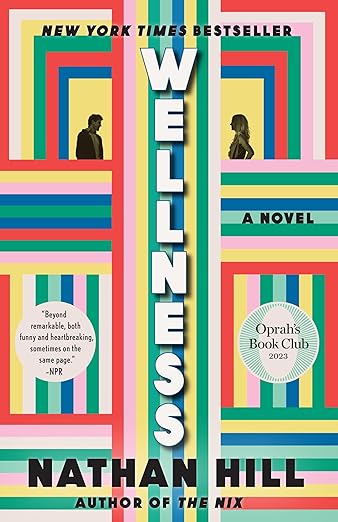
Wellness is a well-written, engaging, and thought-provoking novel. The New York Times describes Wellness as “a unique blend of satire and realism.” There are numerous story arcs. While some are undeniably satirical, others focus on the complexities of modern life, tackling the growth of technology and a wide array of cultural challenges with a realistic lens.
In the early 1990s, one protagonist, Jack Baker, leaves his family where he grew up in Kansas, rejects life on the prairie, and moves to Chicago to pursue a life as a photographer and artist. After spying on Elizabeth through her apartment window in a manner that would lead to charges of voyeurism today, he meets Elizabeth Augustine, the other protagonist. Elizabeth also rejected her family, a wealthy one from Connecticut. They fall in love immediately, then marry and eventually have a child.
Jack and Elizabeth’s child, Toby, has atypical social behaviors, and they disagree on the best way to integrate him into society. Childrearing is difficult, and their decision to build a forever home outside the city leads to several unanticipated setbacks. They soon realize they have grown apart and may not continue to enjoy the status of soulmates. As they experience issues in relationship status a decade after meeting, the novel delves into their back stories and how their families and experiences affected their personalities and life decisions.
The novel does not always progress linearly, but we continually learn more about Jack and Elizabeth, including their formative years, moral compasses, and careers. Elizabeth works at a company called Wellness, whose name plays into the book’s title and predominant theme. When the story focuses on Elizabeth’s career, the reader cannot help but consider what wellness means in the 21st century. The Wellness company provides placebo studies for corporations and organizations. Elizabeth’s role in the company evolves to include more power but devolves when some of the company’s studies become less ethical. Jack’s photography and art inclinations as a youngster have led to his becoming an adjunct faculty member at a college. He is most comfortable with hands-on artwork and less comfortable promoting himself on social media, which is an HR concern at the college.
Through the events of Jack and Elizabeth’s upbringing, marriage, family life, careers, and life decisions, Nathan Hill creates scenarios that force us to think about myriad societal themes. These include but are not limited to the following:
· Acceptance of one’s children’s dreams
· Expectations of marital fidelity and fragility of marriages
· Characteristics of people in upscale, urban, and other neighborhoods
· Value of affordable housing
· Implications of rallying for environmental concerns
· The tenuous nature of friendships
· Competence of builders and landowners
· Effects of social media on different segments of the population, including viral social media rants
· Dualities of wealth and poverty, class distinctions, dishonest accumulation of money
· The omnipresence of family secrets
· Placebos, fake medicine, scam doctors, and con artists posing as health professionals
· Decisions about what is valuable in life
· Lessons from unexpected places


